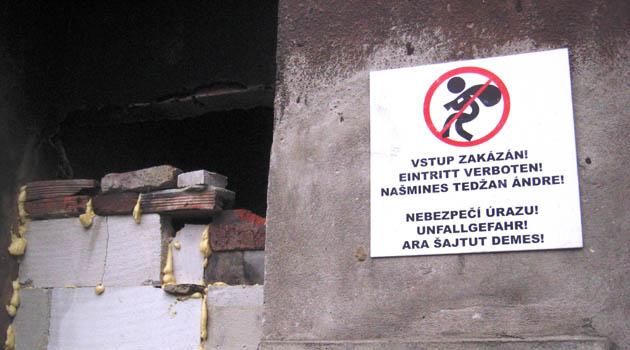News server Peníze.cz ("Money.cz") has just published an article on the issue of Romani social exclusion. News server Romea.cz provides a partial translation into English below. The original article can be found at http://www.penize.cz/prispevek-na-bydleni/249442-na-hrane-bytove-nouze-kolik-sluknovu-se-vejde-do-jednoho-ceska
The migration merry-go-round, ghettos, violence, social unrest… When the Šluknov district exploded here not long ago, it was clear it was time to take action. A year and half later, nothing has changed.
There are hundreds of "socially excluded localities" in the Czech Republic. Things will get worse: The newly adopted Civil Code may intensify the "housing shortage". Do more Šluknovs await us? What does the state have to say?
During the time of the Šluknov crisis, Peníze.cz reported on the destructive migration merry-go-round due to which countless socially deprived (mostly Romani) families (usually labeled "inadaptables") end up in overpriced residential hotels in devastated ghettos. We warned at that time that there are basically many more localities in the Czech Republic at risk of similar explosion.
The fact that this problem continues to smolder in various places around the country is proven frequently, most recently during an incident in which demonstrators protesting the eviction of people from a devastated residential hotel in the Krásné Březno quarter of Ústí nad Labem forced their way into the building of the Ministry of Labor and Social Affairs. The residential hotel was housing people who had been evacuated from the Předlice quarter in the fall. According to the most recent reports, their situations have now been resolved, but the housing situation in the Ústí region definitely has not.
Next year everything could get even worse. "It can be presumed that the number of persons experiencing the ‘housing shortage’ will grow in future," writes the Labor and Social Affairs Ministry in an analysis submitted to the government on 9 January.
The number of people who experience problems with their housing (i.e., who are incapable of obtaining and retaining a normal apartment) will most probably grow because the new Civil Code will take effect then. That legislation will reduce renters’ protections through several innovations.
Daniel Hůle of the People in Need (Člověk v tísni) organization offers an alternative (and more optimistic) view of the matter. Too much protection for tenants, in his view, can paradoxically harm the most deprived.
"Today leasing an apartment to a renter is a big adventure, especially when the tenant doesn’t pay or otherwise fails to uphold the lease," he explains. If a landlord has the option of quickly getting rid of such a tenant, Hůle believes that could lead to a reduction in the landlords’ risk and thereby to less aversion toward those who are socially the most vulnerable. "Paradoxically, liberalization of the lease relationship could benefit the impoverished and increase the number of apartments available to them," he says.
How the state adds fuel to the fire
"Some people are excluded from the standard apartment market because of their low incomes. Some are excluded through discrimination even though they can afford a standard rent, and others are excluded simply because they are not competent enough to uphold a lease over the long term," says Hůle.
The state is paradoxically contributing to the creation of socially excluded ghettos here, and not only through its inaction. The setup of the welfare system is also to blame, in particular, the housing benefit and housing contributions which are a gold mine in the Czech Republic for the owners of these lucrative residential hotels for the impoverished.
In its analysis, the Labor and Social Affairs Ministry recommends the government adopt a law on social housing. or on the "housing shortage", and start resolving the situation. However, this is definitely not the first analysis (and probably won’t be the last) to warn of this problem.
The Office of the ombudsman has been pushing for the adoption of a law on social housing since 2007. The nonprofit sector has also long called for such a move.
"Naturally a law on social housing is simply crucial," says Hůle. In his view, the role of the state is irreplaceable in this area.
"Wherever disadvantaged people migrate within the country, it will always impact the state budget. The behavior of individual landlords, just like the behavior of the municipalities, is ‘rational’ from a short-term perspective in many respects, but it is also discriminatory," argues Hůle.
A law on social housing has been submitted to Parliament in various forms. None of them has managed to make it through.
